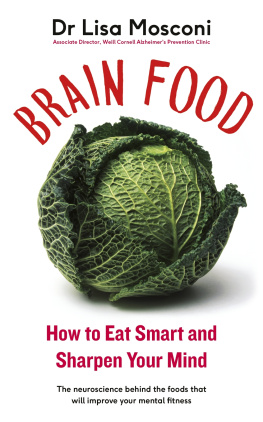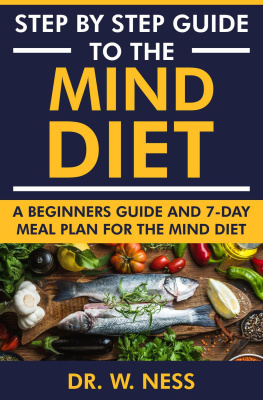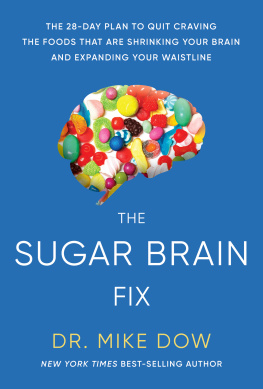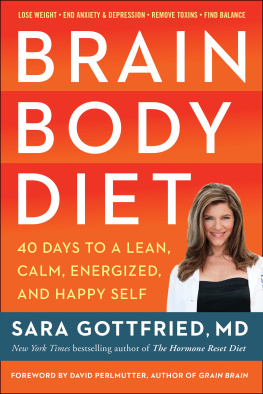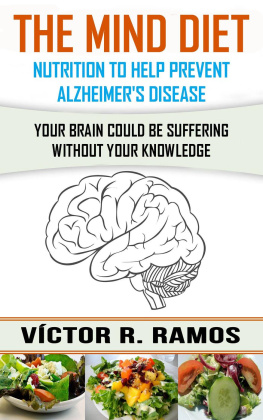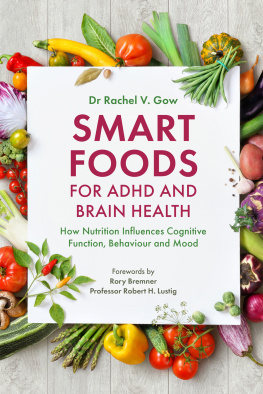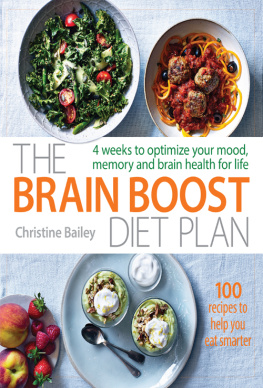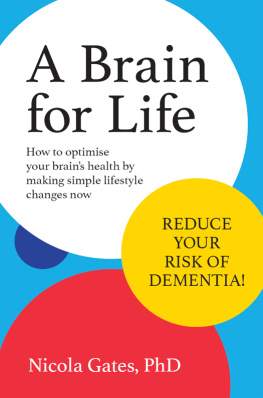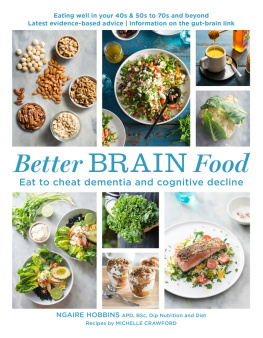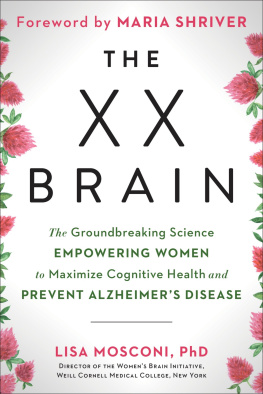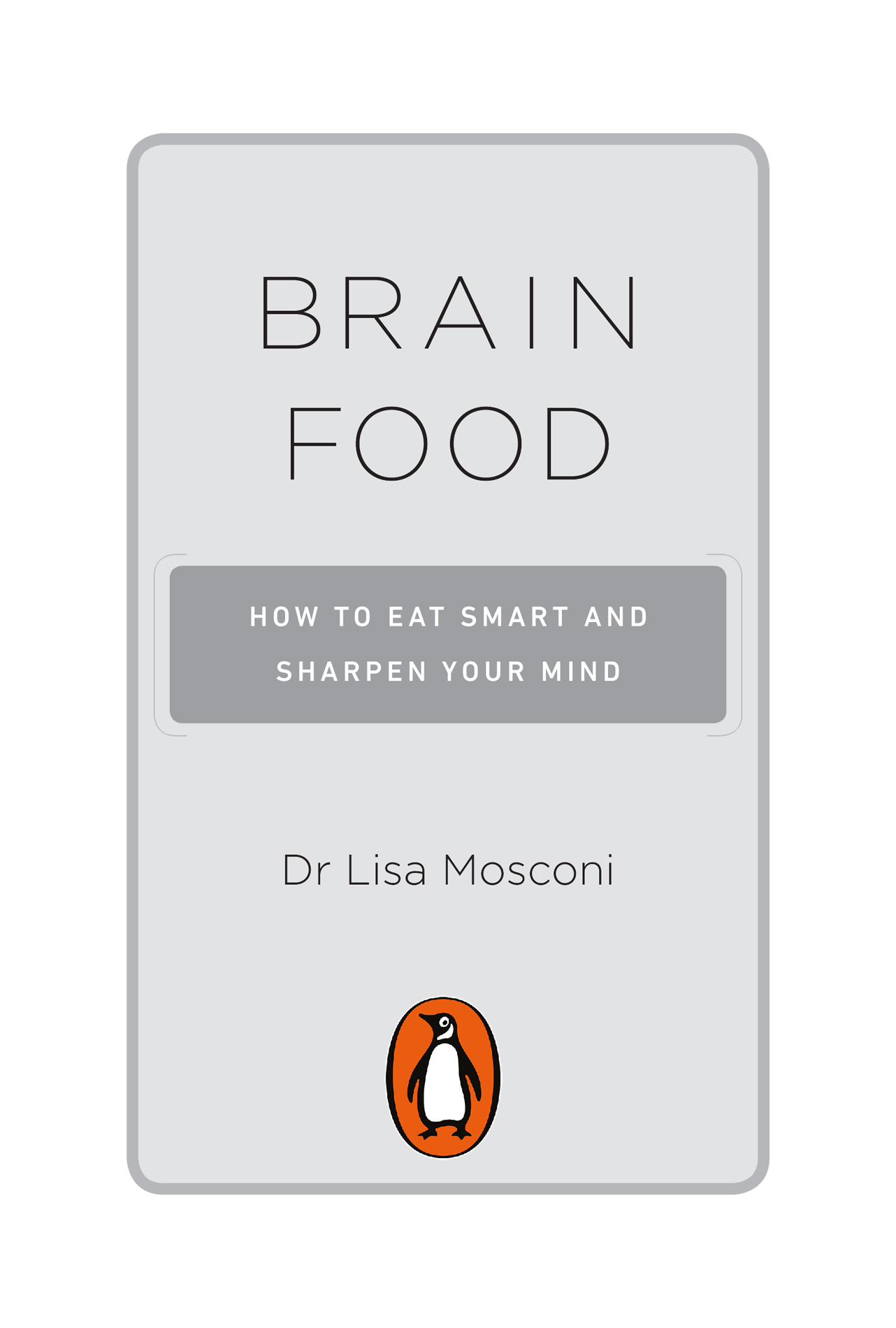6: CARBS, SUGARS, AND MORE SWEET THINGS
.
11: A HOLISTIC APPROACH TO BRAIN HEALTH
Make sure that you dont overdo it with large fish such as tuna and shark, which tend to be high in mercury. Pregnant women should always avoid fish with high mercury levels.
12: BE MINDFUL OF QUALITY OVER QUANTITY
Caution: Omega-3s can have a blood-thinning effect and might increase the action of blood-thinning medications such as warfarin and aspirin. Too much omega-3 can also result in bleeding and bruising. Always consult a health-care professional before adding omega-3 supplements to your diet.
Caution: CoQ10 might interfere with blood-thinning medications like warfarin and aspirin. Speak with your physician.
BRAIN FOOD
This is one of the most exciting reads on brain health that I have ever come across. As well as the fascinating and relatable science, Dr Mosconi has expertly complemented the wealth of information with delicious recipes influenced by her work and emerging research into gut health. A doctor after my own heart! I cannot recommend this book enough and it gives yet further evidence about the true power of nutrition on our health Rupy Aujla, author of The Doctors Kitchen
Brain Food is a critically important book. Food is medicine or it is poison. The brain uses 20 to 30 per cent of the calories you consume. If you want to keep and save your brain you have to get your food right. Brain Food will help you do just that in a delicious, easy way Daniel G. Amen, MD, Founder, Amen Clinics, and author of Memory Rescue
If we knew what our brains looked like, wed take better care of them. Often surprising, always accessible, this fascinating book not only reveals the science behind neuro-nutrition, it shows us what we could be eating for maximum brain power Sara Gottfried, MD, the New York Times bestselling author of Younger, The Hormone Reset Diet and The Hormone Cure
Natural food, rooted in the Mediterranean style and gut-friendly, is the miracle pill we have the opportunity to ingest three times a day for a healthy brain and body. Dr Lisa Mosconi explains the science and how to reap the benefits of foods in all their complexities and synergies eaten with pleasure at each meal Jeannette Hyde, author of The Gut Makeover
Over the years, I have learned so much from the work of Dr Mosconi, whose accomplished credentials spanning both neuroscience and nutrition are wholly unique. This book represents the first time her studies on the interaction between food and long-term cognitive function reach a general audience. Dr Mosconi always makes the point that we would eat differently and treat our brains better if only we could see what we are doing to them. From the lab to the kitchen, this is extremely valuable and urgent advice, complete with recommendations that any one of us can take Dr Richard S. Isaacson, MD, author of The Alzheimers Prevention and Treatment Diet and Alzheimers Treatment Alzheimers Prevention: A Patient and Family Guide
Can a Mediterranean diet help avert Alzheimers? Mosconis persuasive account of the surprising connection between food and brain health sparkles with well-researched nutritional evidence. Brain Food offers culinary wisdom and reasons for hope in equal measure Richard Wrangham, PhD, Ruth B. Moore Professor of Biological Anthropology at Harvard University and author of Catching Fire
ABOUT THE AUTHOR
Lisa Mosconi is the Associate Director of the Alzheimers Prevention Clinic of the Department of Neurology at Weill Cornell Medical College, and was the founder and director of the Nutrition and Brain Fitness Lab at New York University. She holds a dual PhD degree in Neuroscience and Nuclear Medicine from the University of Florence, Italy, and is a certified integrative nutritionist and a board-certified, holistic healthcare practitioner.
www.lisamosconi.com
PENGUIN LIFE
UK | USA | Canada | Ireland | Australia
India | New Zealand | South Africa
Penguin Life is part of the Penguin Random House group of companies whose addresses can be found at global.penguinrandomhouse.com.
First published in the United States of America by Avery, an imprint of Penguin Random House 2018
First published in Great Britain by Penguin Life 2018
Copyright Dr Lisa Mosconi, 2018
Neither the author nor the publisher is engaged in providing any medical diagnosis or treatment to individual readers. The information contained in this book is no substitute for medical advice. If you have any specific questions about any medical matter you should always consult your doctor. Neither the author nor the publisher can accept any liability for any loss, injury or damage which is sustained by readers in consequence of adopting any suggestions or of using the information in this book
The moral right of the author has been asserted
Cover photo Andy Crawford / Getty Images
ISBN: 978-0-241-97632-6
To my family,
whose love I shall never forget
Preface
A few years ago, I delivered the keynote at an international conference on the prevention of Alzheimers disease. It was a beautiful sunny day in Italy, the lecture hall brimming with doctors, students, and laymen, all eager to hear the latest on pharmacological treatments for Alzheimers.
I was much less eager to be the bearer of bad news. Unfortunately, current medications for Alzheimers lessen symptoms for a limited amount of time but cannot stop the damage that aging and disease cause to brain cells. A new generation of disease-modifying drugs is under development, but clinical trials have yielded mostly disappointing results so far, confirming what everyone knew: there is no cure in sight.
At which point someone in the audience asked: How about olive oil?
My neuroscience-trained brain was baffled. Olive oil?
Olive oil was not in any of my research proposals, or in any way part of my education. I got my PhD in neuroscience and nuclear medicine to focus on the genetic aspects of the disease, motivated in part by seeing its devastating effects on my immediate family. My work for the last fifteen years has been focused on the early detection of Alzheimers. Specifically, in my research I use brain imaging techniques, such as magnetic resonance imaging (MRI) and positron emission tomography (PET), to look at peoples brains in relationship to their genetic backgrounds, and in doing so, learn about their likelihood of developing disease.
This work led me to direct the Family History of Alzheimers research program at the NYU School of Medicine back in 2009. The program focuses on the children and family members of Alzheimers patients. Everyone there has broadly the same concern: Am I at risk for Alzheimers and what can I do to make sure I dont get it?
Over the years, I experienced a change in the kinds of questions I was asked by our patients, much like the olive oil question at the conference. Beyond the discussions about genes and DNA, sooner or later the conversation turned to food: What should I eat to keep my brain healthy?
While all my research draws on my education as an adult, everything I associate with food comes from my upbringing in Florence, Italy. Back in my hometown, I developed a heartfelt appreciation for wholesome, healthy food from a very young age, which I took for granted until I moved to the United States to study for my PhD. I had not anticipated the challenge of finding a flavorful tomato or the artery-clogging danger hidden within a seemingly innocent chocolate chip cookie. As I struggled with my own diet in my new environment, I learned from my research that I was not alone. By their own accounts, more than half of my study participants reported only trace amounts of vegetables and fruits in their diets.

